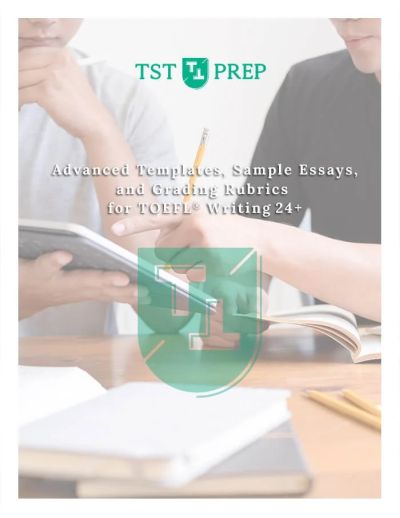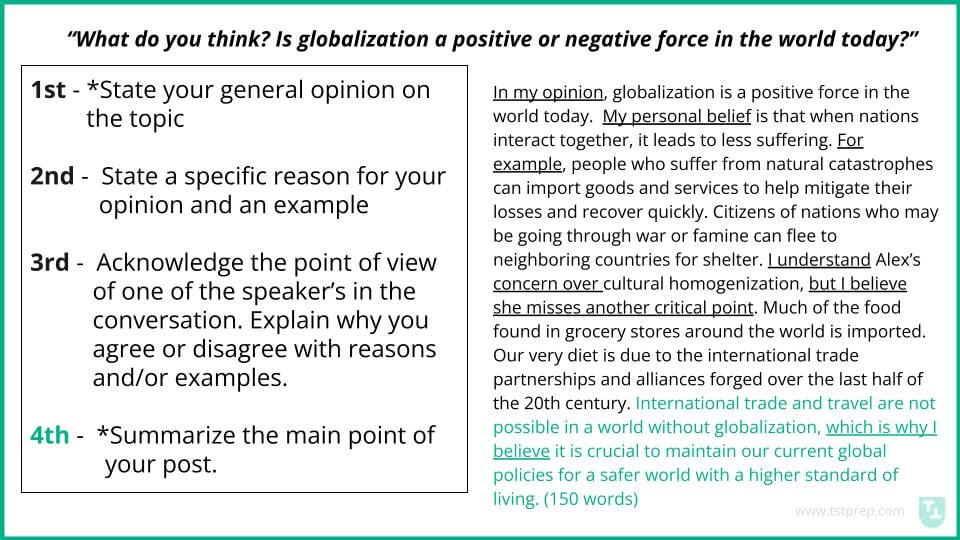
- TOEFL Materials
- DUOLINGO Materials
- TOEFL Articles
- DUOLINGO Articles


Sample Essays for the Writing Section of the TOEFL® Test
Did you hear about the updated TOEFL iBT Writing section?
On July 26, 2023, ETS introduced a new TOEFL Writing question : Writing for an Academic Discussion.
That’s right. The Independent Writing question has been retired from the official TOEFL iBT test.
Before we get into the topics and sample essays for the new TOEFL Writing question, let’s start with the first task, which hasn’t changed, the Integrated Writing.
TOEFL Integrated Writing Topics
In the TOEFL Writing Section, there are two questions you must respond to. The first question is called the TOEFL Integrated Writing task. The second question is called the TOEFL Writing for an Academic Discussion task.
The integrated question presents a reading and listening passage, followed by a question, which is a bit more complicated.
Simple, right?
No? Still confused.
No worries. The best way to understand something better is through examples.
Let’s do one together.
This TOEFL integrated writing topic deals with the use of Corn Ethanol.
Give yourself three minutes to read it:
The chemical compound, ethanol, has risen in recent years as the most viable alternative to fossil fuels. Ethanol is a renewable fuel made from crops, mainly from corn in the United States, which can power engines. There are many who argue that corn ethanol should replace fossil fuel gas as the primary source for running cars.
One major benefit of using corn ethanol is that it uses less energy than gasoline. Using less energy means that people can get better gas mileage while driving these more fuel-efficient cars. In the long-run, this will be cheaper for consumers because they can drive further than they do now with fossil-fueled cars. People will spend less money on gas because they won’t have to stop to fill up as frequently.
Another advantage of switching to corn ethanol is that it helps the American economy become less reliant on energy sources from other countries. Petroleum is not readily available in the U.S., so it must be imported from other countries. Depending on foreign relations with those countries, fuel becomes a political issue. Corn is a crop that America has in abundance. By using corn ethanol instead, the cost of gas will decrease because now the import taxes on fossil fuels are calculated into the price. This also means that we will be putting the money into our own economy, thus helping local corn farmers.
One of the most attractive aspects of corn ethanol is how environmentally friendly is when compared to current automobile gasoline. Fossil fuels release carbon that has been stored for years from the earth. Burning biofuels, like corn ethanol, is better for the environment because it releases less greenhouse gas emissions. Lessening the amount of carbon emissions will help prevent global warming and all of the other negative effects of climate change.
Once three minutes have ended, listen to a conversation about the same topic
Now, it’s time to write your TOEFL essay.
Stop reading.
Start writing.
Write your essay before you look at this TOEFL Writing sample. You will learn a lot more if you actually write the essay and then compare this to your own.
Here’s an expert TOEFL teacher’s sample essay to this particular TOEFL Writing topic.
The article introduces the topic of corn-based ethanol. More specifically, the writer discusses the advantages of switching from fossil fuels to this alternative energy source. The lecturer in the listening passage disagrees. He believes that the benefits the author mentions are misleading and attacks each of the claims made in the reading.
In the reading, the author begins by stating that drivers will get better gas mileage on corn ethanol than on fossil fuels, and therefore save money on gas. The speaker, however, disagrees. He states that the production of corn ethanol is very expensive. He says that in order to make for the costs to create and distribute this biofuel, the price of ethanol gas will increase. Therefore, it will not be any cheaper for consumers in the long run.
The writer also claims that making the switch to corn ethanol will help the American economy because it will make the United States less dependent on foreign oil. Again, the lecturer believes there are flaws in the writer’s argument. He holds instead that mass use of corn-based ethanol will hurt the economy. He elaborates this by point out that the inevitable competition for corn by multiple consumers, including beef and dairy farmers, will drive the price of corn up.
Another reason why the author feels that moving from traditional gasoline to corn ethanol is a good idea is that they are more environmentally friendly than fossil fuels. The professor in the listening passage is doubtful that this is accurate. He suggests that as more farmlands are created to support the demands for more corn, more carbon will be absorbed by the land. This means that these emissions will still be released to negatively affect the environment.
As you can see the author and speaker hold very different views about the use of corn ethanol.
The author here clearly defined the main idea, organized the supporting points from both the reading and listening passage, and showed how they differ from each other.
I know it may seem a bit difficult, which is why I recommend that you start off with a TOEFL Writing template for both the Writing for an Academic Discussion task and Integrated essay.
Looking for more example essays?
Download our TOEFL Writing 24+ Guide if you would like more sample essays. It includes extra tips, tricks, and strategies you will not find anywhere else. Download it for free
Too complicated? Don’t worry.
I will share TOEFL writing templates for the Integrated Writing question, which will make your life a whole lot easier.
We have to talk about the Writing for an Academic Discussion question.

Writing for an Academic Discussion Question
You will have 10 minutes to complete the Writing for an Academic Discussion question .
For this task, you will participate in an online discussion. After you read the question and student responses, you will have to write a response that adds to the conversation.
Here’s the breakdown:
This question is straightforward, but let’s do a sample together.
When the question appears on the screen, take two minutes to scan the passage and the student’s opinions.

Start to write your response. Be sure to add to the discussion and avoid repeating the same points as the other students.
Aim to write at least 120 words.


Get peace of mind with these TOEFL Writing Templates
Now that you have a few TOEFL Writing topics and sample essays to study from, you may want to use a writing template to help guide your writing.
A TOEFL template is basically a pre-organized set of words and phrases that you can use in almost any TOEFL Writing response.
Here’s TST Prep’s template for the integrated TOEFL Writing question (question one):
And here’s our template for the independent TOEFL Writing for an Academic Discussion (question two):
The article introduces the topic of (general topic) . More specifically, the writer discusses (stance of the author on the topic) . The lecturer in the listening passage disagrees. He believes that (stance of the professor on the topic) and attacks each of the claims made in the reading.
In the reading, the author begins by stating that (first point made to support stance) . The lecturer, however, disagrees. He states that (first counterargument by the professor) . He goes on to say that (additional detail about first counterargument) .
The author also claims that (second point made to support stance) . Again, the lecturer believes there are flaws in the writer’s argument. The speaker holds that (two sentences about the professor’s second counter-argument) .
Another reason why the author feels that (restate stance of author) is that (third point made to support stance) . The professor in the listening passage is doubtful that this is accurate. He suggests that (two sentences about the professor’s third counter argument) .
To sum up, both the writer and professor hold conflicting views about (general topic) . It’s clear that they will have trouble finding common ground on this issue.
You will notice that the sample essays in this article differ from the templates.
You do not have to use templates, it’s up to you. Some people prefer to write in their own unique fashion for the entire exam. However, you will notice that the structure of the templates is similar to the TOEFL example essays.
These templates follow the exact organization and structure you are expected to use on test day, so don’t hesitate to use them in your writing.
Also, don’t forget to download the free 24+ TOEFL Writing Guide if you would like more example essays, templates, and exclusive tips to help you earn the best possible TOEFL Writing score on test day.
If you read this far, it means you are serious about your TOEFL studies. Don’t hesitate to send us an email and let us know how we can help you earn the TOEFL score of your dreams – [email protected]
Did we forget anything? Please comment and let us know how we can improve our TOEFL Writing advice (or if you want to just say hi that would be great too).
113 Comments
Hello, Josh. Firstly, thanks for the useful tips. I wonder if I can get a point if I don’t understand the lecture but write everything about reading. Should every idea in the passage and audio be matched?
Hi Ella, Thanks for your question. In general, the listening points should correspond with the reading. This is because the listening usually argues the opposite points.
Hi, Josh. I have a question about copying and pasting in TOEFL writing. I heard some TOEFL teachers say it should be avoided because ETS will consider it a potential form of plagiarism in future academic study.
Could you please provide some suggestions in terms of this issue? Is it ok to copy and paste, since it saves a lot of time in writing, especially on the test day. Thank you!
Great question. The copy-and-paste feature will not work at the test center, and I do not believe it works on the Home Edition either. Regardless, copying and pasting or manually copying the exact words should be avoided. You are always better off putting the answer into your own words.
Abdul Siyar Azizi
Hello Josh, I have a question regarding how we can write an advanced writing that will be scored 25+?
Thanks very much for your question. We do have some templates that can help to increase your score. However, to give you a more detailed answer, I would suggest you consider doing an essay evaluation with us so we can help you determine specific areas for improvement. In the meantime, here are some articles that can help.
https://tstprep.com/articles/toefl/ten-awesome-tips-for-the-writing-section-of-the-toefl-test/
https://tstprep.com/articles/toefl/sample-essays-for-the-writing-section-of-the-toefl-test/
Hi Josh! For the academic writing, I only gave my reason for the topic, and I forgot to mention the opinion of the other student. I checked my word count. It is already past 100 words, and I do not want it to be too long. Do we really need to mention the other students’ opinion?
Hi Ireen. Great question! We often suggest mentioning one of the other students, but it is not required. As long as what you said was on topic, you “added to the discussion,” and gave specific reasons and examples, you should be okay with the 100 words you wrote.
Hello, I have a question about the independent writing: Is it a problem if I just give one reason in my essay (but detailed enough)? Thank you
Hi there and thank you for your question. There are no specific grading criteria that say you MUST give two reasons for your opinion, so, in theory, yes, you can just give one reason. I don’t think you will be marked down for it. If possible, try to give two though. It will make your word count higher.
Leave a Reply Cancel reply
Your email address will not be published. Required fields are marked *
This site uses Akismet to reduce spam. Learn how your comment data is processed .

Ten Awesome Tips for the Listening Section of the TOEFL® Test

Your Guide to Answering Reading Summary Questions for the TOEFL® Test

How to Prepare for the TOEFL® or TOEIC® test – Interview with Steve Kaufmann

Complete Practice Test for the TOEFL® Test
Create a FREE Practice Account
Join now and start learning with our free materials

TRIAL LESSON FOR THE TOEFL® iBT for just $10 - GET YOUR TRIAL LESSON NOW

- Privacy Overview
- Strictly Necessary Cookies
- 3rd Party Cookies
This website uses cookies so that we can provide you with the best user experience possible. Cookie information is stored in your browser and performs functions such as recognising you when you return to our website and helping our team to understand which sections of the website you find most interesting and useful.
Strictly Necessary Cookie should be enabled at all times so that we can save your preferences for cookie settings.
If you disable this cookie, we will not be able to save your preferences. This means that every time you visit this website you will need to enable or disable cookies again.
This website uses Google Analytics to collect anonymous information such as the number of visitors to the site, and the most popular pages.
Keeping this cookie enabled helps us to improve our website.
Please enable Strictly Necessary Cookies first so that we can save your preferences!

IMAGES
VIDEO